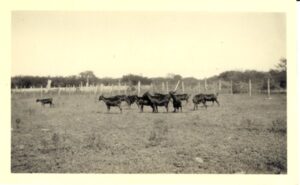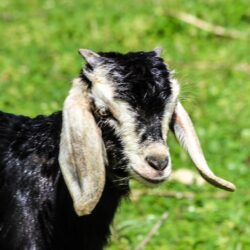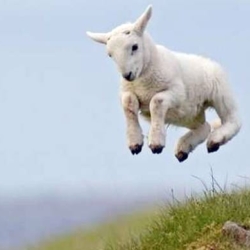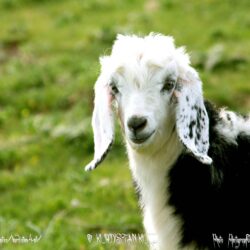Unfortunately I was unable to find a proper native Guaraní speaker to proofread this text in time, so if you know of one then feel free to comment or look it over — I’m happy to make any edits that are necessary to make it grammatically correct. (Although, to be fair, it’s not like the original text is grammatically correct either!)
Also included is a method for writing Guaraní text in Hebrew script.
| Source (Aramaic) | Translation (Guaraní) | Translation (Guaraní, hebraicized) | Translation (English) |
|---|---|---|---|
חַד גַּדְיָא, חַד גַּדְיָא. דְּזַבִּן אַבָּא בִּתְרֵי זוּזֵי, חַד גַּדְיָא, חַד גַּדְיָא. |
Peteĩ kavara ra’y, peteĩ kavara ra’y, ojoguava’ekue che ru mokõi pláta rehe, peteĩ kavara ra’y, peteĩ kavara ra’y. |
פֵּיטֵי֘ין קַבַﬞרַה רַאﬞוִ, פֵּיטֵי֘ין קַבַﬞרַה רַאﬞוִ אוֹיﬞוֹװַבַﬞאֵﬞיקְוֵי שֵׁי רוּ מוֹקוֹ֘י פְּלַטַה רֵיהֵי פֵּיטֵי֘ין קַבַﬞרַה רַאﬞוִ, פֵּיטֵי֘ין קַבַﬞרַה רַאﬞוִ. |
One little goat, one little goat that my father bought for two zuzim. One little goat, one little goat. |
וְאָתָא שֻׁנְרָא וְאָכְלָה לְגַדְיָא, דְּזַבִּן אַבָּא בִּתְרֵי זוּזֵי, חַד גַּדְיָא, חַד גַּדְיָא. |
Ha upéi katu ou mbarakaja ha ho’u pe kavara ra’y, ojoguava’ekue che ru mokõi pláta rehe, peteĩ kavara ra’y, peteĩ kavara ra’y. |
חַאוּפֵּיי קַטוּ אוֹאוּ מְבַּרַקַיַﬞה חַחוֹאﬞוּ פֵּיקַבַﬞרַה רַאﬞוִ אוֹיﬞוֹװַבַﬞאֵﬞיקְוֵי שֵׁי רוּ מוֹקוֹ֘י פְּלַטַה רֵיהֵי פֵּיטֵי֘ין קַבַﬞרַה רַאﬞוִ, פֵּיטֵי֘ין קַבַﬞרַה רַאﬞוִ. |
A cat came and ate the goat that my father bought for two zuzim. One little goat, one little goat. |
וְאָתָא כַּלְבָּא וְנָשַׁךְ לְשֻׁנְרָא, דְּאָכְלָה לְגַדְיָא, דְּזַבִּן אַבָּא בִּתְרֵי זוּזֵי, חַד גַּדְיָא, חַד גַּדְיָא. |
Ha upéi katu ou jagua ha oisu’u pe mbarakaja, ho’uva’ekue pe kavara ra’y, ojoguava’ekue che ru mokõi pláta rehe, peteĩ kavara ra’y, peteĩ kavara ra’y. |
חַאוּפֵּיי קַטוּ אוֹאוּ יַﬞװַה חַאוֹיְסוּאﬞוּ פֵּימְבַּרַקַיַﬞה חוֹאﬞוּבַﬞאֵﬞיקְוֵי פֵּיקַבַﬞרַה רַאﬞוִ אוֹיﬞוֹװַבַﬞאֵﬞיקְוֵי שֵׁי רוּ מוֹקוֹ֘י פְּלַטַה רֵיהֵי פֵּיטֵי֘ין קַבַﬞרַה רַאﬞוִ, פֵּיטֵי֘ין קַבַﬞרַה רַאﬞוִ. |
A dog came and bit the cat that ate the goat that my father bought for two zuzim. One little goat, one little goat. |
וְאָתָא חֻטְרָא וְהִכָּה לְכַלְבָּא, דְּנָשַׁךְ לְשֻׁנְרָא, דְּאָכְלָה לְגַדְיָא, דְּזַבִּן אַבָּא בִּתְרֵי זוּזֵי, חַד גַּדְיָא, חַד גַּדְיָא. |
Ha upéi katu ou yvyra’i ha oinupã pe jagua, oisu’uva’ekue pe mbarakaja, ho’uva’ekue pe kavara ra’y, ojoguava’ekue che ru mokõi pláta rehe, peteĩ kavara ra’y, peteĩ kavara ra’y. |
חַאוּפֵּיי קַטוּ אוֹאוּ אוִבﬞוִרַאִﬞי חַאוֹאִינוּפַּ֘ן פֵּייַﬞװַה אוֹיְסוּאﬞוּבַﬞאֵﬞיקְוֵי פֵּימְבַּרַקַיַﬞה חוֹאﬞוּבַﬞאֵﬞיקְוֵי פֵּיקַבַﬞרַה רַאﬞוִ אוֹיﬞוֹװַבַﬞאֵﬞיקְוֵי שֵׁי רוּ מוֹקוֹ֘י פְּלַטַה רֵיהֵי פֵּיטֵי֘ין קַבַﬞרַה רַאﬞוִ, פֵּיטֵי֘ין קַבַﬞרַה רַאﬞוִ. |
A stick came and hit the dog that bit the cat that ate the goat that my father bought for two zuzim. One little goat, one little goat. |
וְאָתָא נוּרָא וְשָׂרַף לְחֻטְרָא, דְּהִכָּה לְכַלְבָּא, דְּנָשַׁךְ לְשֻׁנְרָא, דְּאָכְלָה לְגַדְיָא, דְּזַבִּן אַבָּא בִּתְרֵי זוּזֵי, חַד גַּדְיָא, חַד גַּדְיָא. |
Ha upéi katu ou tata ha ohapý pe yvyra’i, oinupãva’ekue pe jagua, oisu’uva’ekue pe mbarakaja, ho’uva’ekue pe kavara ra’y, ojoguava’ekue che ru mokõi pláta rehe, peteĩ kavara ra’y, peteĩ kavara ra’y. |
חַאוּפֵּיי קַטוּ אוֹאוּ טַטַה חַאוֹחַפּוִ פֵּיאוִבﬞוִרַאִﬞי אוֹינוּפַּ֘בַﬞאֵﬞיקְוֵי פֵּייַﬞװַה אוֹיְסוּאﬞוּבַﬞאֵﬞיקְוֵי פֵּימְבַּרַקַיַﬞה חוֹאﬞוּבַﬞאֵﬞיקְוֵי פֵּיקַבַﬞרַה רַאﬞוִ אוֹיﬞוֹװַבַﬞאֵﬞיקְוֵי שֵׁי רוּ מוֹקוֹ֘י פְּלַטַה רֵיהֵי פֵּיטֵי֘ין קַבַﬞרַה רַאﬞוִ, פֵּיטֵי֘ין קַבַﬞרַה רַאﬞוִ. |
A fire came and burned the stick that hit the dog that bit the cat that ate the goat that my father bought for two zuzim. One little goat, one little goat. |
וְאָתָא מַיָּא וְכָבָה לְנוּרָא, דְּשָׂרַף לְחֻטְרָא, דְּהִכָּה לְכַלְבָּא, דְּנָשַׁךְ לְשֻׁנְרָא, דְּאָכְלָה לְגַדְיָא, דְּזַבִּן אַבָּא בִּתְרֵי זוּזֵי, חַד גַּדְיָא, חַד גַּדְיָא. |
Ha upéi katu ou y ha ombogue pe tata, ohapyva’ekue pe yvyra’i, oinupãva’ekue pe jagua, oisu’uva’ekue pe mbarakaja, ho’uva’ekue pe kavara ra’y, ojoguava’ekue che ru mokõi pláta rehe, peteĩ kavara ra’y, peteĩ kavara ra’y. |
חַאוּפֵּיי קַטוּ אוֹאוּ אוִ חַאוֹמְבּוֹװֵי פֵּיטַטַה אוֹחַפּוִבַﬞאֵﬞיקְוֵי פֵּיאוִבﬞוִרַאִﬞי אוֹינוּפַּ֘בַﬞאֵﬞיקְוֵי פֵּייַﬞװַה אוֹיְסוּאﬞוּבַﬞאֵﬞיקְוֵי פֵּימְבַּרַקַיַﬞה חוֹאﬞוּבַﬞאֵﬞיקְוֵי פֵּיקַבַﬞרַה רַאﬞוִ אוֹיﬞוֹװַבַﬞאֵﬞיקְוֵי שֵׁי רוּ מוֹקוֹ֘י פְּלַטַה רֵיהֵי פֵּיטֵי֘ין קַבַﬞרַה רַאﬞוִ, פֵּיטֵי֘ין קַבַﬞרַה רַאﬞוִ. |
Water came and put out the fire that burned the stick that hit the dog that bit the cat that ate the goat that my father bought for two zuzim. One little goat, one little goat. |
וְאָתָא תּוֹרָא וְשָׁתָא לְמַיָּא, דְּכָבָה לְנוּרָא, דְּשָׂרַף לְחֻטְרָא, דְּהִכָּה לְכַלְבָּא, דְּנָשַׁךְ לְשֻׁנְרָא, דְּאָכְלָה לְגַדְיָא, דְּזַבִּן אַבָּא בִּתְרֵי זוּזֵי, חַד גַּדְיָא, חַד גַּדְיָא. |
Ha upéi katu ou guéi ha ho’u pe y, ombogueva’ekue pe tata, ohapyva’ekue pe yvyra’i, oinupãva’ekue pe jagua, oisu’uva’ekue pe mbarakaja, ho’uva’ekue pe kavara ra’y, ojoguava’ekue che ru mokõi pláta rehe, peteĩ kavara ra’y, peteĩ kavara ra’y. |
חַאוּפֵּיי קַטוּ אוֹאוּ װֵיי חַחוֹאﬞוּ פֵּיאוִ אוֹמְבּוֹװֵיבַﬞאֵﬞיקְוֵי פֵּיטַטַה אוֹחַפּוִבַﬞאֵﬞיקְוֵי פֵּיאוִבﬞוִרַאִﬞי אוֹינוּפַּ֘בַﬞאֵﬞיקְוֵי פֵּייַﬞװַה אוֹיְסוּאﬞוּבַﬞאֵﬞיקְוֵי פֵּימְבַּרַקַיַﬞה חוֹאﬞוּבַﬞאֵﬞיקְוֵי פֵּיקַבַﬞרַה רַאﬞוִ אוֹיﬞוֹװַבַﬞאֵﬞיקְוֵי שֵׁי רוּ מוֹקוֹ֘י פְּלַטַה רֵיהֵי פֵּיטֵי֘ין קַבַﬞרַה רַאﬞוִ, פֵּיטֵי֘ין קַבַﬞרַה רַאﬞוִ. |
An ox came and drank the water that put out the fire that burned the stick that hit the dog that bit the cat that ate the goat that my father bought for two zuzim. One little goat, one little goat. |
וְאָתָא הַשּׁוֹחֵט וְשָׁחַט לְתוֹרָא, דְּשָׁתָא לְמַיָּא, דְּכָבָה לְנוּרָא, דְּשָׂרַף לְחֻטְרָא, דְּהִכָּה לְכַלְבָּא, דְּנָשַׁךְ לְשֻׁנְרָא, דְּאָכְלָה לְגַדְיָא, דְּזַבִּן אַבָּא בִּתְרֵי זוּזֵי, חַד גַּדְיָא, חַד גַּדְיָא. |
Ha upéi katu ou so’oñemuha ha ojuka pe guéi, ho’uva’ekue pe y, ombogueva’ekue pe tata, ohapyva’ekue pe yvyra’i, oinupãva’ekue pe jagua, oisu’uva’ekue pe mbarakaja, ho’uva’ekue pe kavara ra’y, ojoguava’ekue che ru mokõi pláta rehe, peteĩ kavara ra’y, peteĩ kavara ra’y. |
חַאוּפֵּיי קַטוּ אוֹאוּ סוֹאﬞוֹנֵﬞימוּחַה חַאוֹיﬞוּקַה פֵּיװֵיי חוֹאﬞוּבַﬞאֵﬞיקְוֵי פֵּיאוִ אוֹמְבּוֹװֵיבַﬞאֵﬞיקְוֵי פֵּיטַטַה אוֹחַפּוִבַﬞאֵﬞיקְוֵי פֵּיאוִבﬞוִרַאִﬞי אוֹינוּפַּ֘בַﬞאֵﬞיקְוֵי פֵּייַﬞװַה אוֹיְסוּאﬞוּבַﬞאֵﬞיקְוֵי פֵּימְבַּרַקַיַﬞה חוֹאﬞוּבַﬞאֵﬞיקְוֵי פֵּיקַבַﬞרַה רַאﬞוִ אוֹיﬞוֹװַבַﬞאֵﬞיקְוֵי שֵׁי רוּ מוֹקוֹ֘י פְּלַטַה רֵיהֵי פֵּיטֵי֘ין קַבַﬞרַה רַאﬞוִ, פֵּיטֵי֘ין קַבַﬞרַה רַאﬞוִ. |
A butcher came and slaughtered the ox that drank the water that put out the fire that burned the stick that hit the dog that bit the cat that ate the goat that my father bought for two zuzim. One little goat, one little goat. |
וְאָתָא מַלְאַךְ־הַמָּ֫וֶת וְשָׁחַט לְשׁוֹחֵט, דְּשָׁחַט לְתוֹרָא, דְּשָׁתָא לְמַיָּא, דְּכָבָה לְנוּרָא, דְּשָׂרַף לְחֻטְרָא, דְּהִכָּה לְכַלְבָּא, דְּנָשַׁךְ לְשֻׁנְרָא, דְּאָכְלָה לְגַדְיָא, דְּזַבִּן אַבָּא בִּתְרֵי זוּזֵי, חַד גַּדְיָא, חַד גַּדְיָא. |
Ha upéi katu ou ñemano ha ojuka pe so’oñemuha, ojukava’ekue pe guéi, ho’uva’ekue pe y, ombogueva’ekue pe tata, ohapyva’ekue pe yvyra’i, oinupãva’ekue pe jagua, oisu’uva’ekue pe mbarakaja, ho’uva’ekue pe kavara ra’y, ojoguava’ekue che ru mokõi pláta rehe, peteĩ kavara ra’y, peteĩ kavara ra’y. |
חַאוּפֵּיי קַטוּ אוֹאוּ נֵﬞימַנוֹ חַאוֹיﬞוּקַה פֵּיסוֹאﬞוֹנֵﬞימוּחַה אוֹיﬞוּקַבַﬞאֵﬞיקְוֵי פֵּיװֵיי חוֹאﬞוּבַﬞאֵﬞיקְוֵי פֵּיאוִ אוֹמְבּוֹװֵיבַﬞאֵﬞיקְוֵי פֵּיטַטַה אוֹחַפּוִבַﬞאֵﬞיקְוֵי פֵּיאוִבﬞוִרַאִﬞי אוֹינוּפַּ֘בַﬞאֵﬞיקְוֵי פֵּייַﬞװַה אוֹיְסוּאﬞוּבַﬞאֵﬞיקְוֵי פֵּימְבַּרַקַיַﬞה חוֹאﬞוּבַﬞאֵﬞיקְוֵי פֵּיקַבַﬞרַה רַאﬞוִ אוֹיﬞוֹװַבַﬞאֵﬞיקְוֵי שֵׁי רוּ מוֹקוֹ֘י פְּלַטַה רֵיהֵי פֵּיטֵי֘ין קַבַﬞרַה רַאﬞוִ, פֵּיטֵי֘ין קַבַﬞרַה רַאﬞוִ. |
The Angel of Death came and slaughtered the shoḥet who slaughtered the ox that drank the water that put out the fire that burned the stick that hit the dog that bit the cat that ate the goat that my father bought for two zuzim. One little goat, one little goat. |
וְאָתָא הַקָּדוֹשׁ־בָּרוּךְ־הוּא וְשָׁחַט לְמַלְאַךְ־הַמָּ֫וֶת דְּשָׁחַט לְשׁוֹחֵט, דְּשָׁחַט לְתוֹרָא, דְּשָׁתָא לְמַיָּא, דְּכָבָה לְנוּרָא, דְּשָׂרַף לְחֻטְרָא, דְּהִכָּה לְכַלְבָּא, דְּנָשַׁךְ לְשֻׁנְרָא, דְּאָכְלָה לְגַדְיָא, דְּזַבִּן אַבָּא בִּתְרֵי זוּזֵי, חַד גַּדְיָא, חַד גַּדְיָא. |
Ha upéi katu ou Tupã ojehovasáva ha ojuka pe ñemano ojukava’ekue pe so’oñemuha, ojukava’ekue pe guéi, ho’uva’ekue pe y, ombogueva’ekue pe tata, ohapyva’ekue pe yvyra’i, oinupãva’ekue pe jagua, oisu’uva’ekue pe mbarakaja, ho’uva’ekue pe kavara ra’y, ojoguava’ekue che ru mokõi pláta rehe, peteĩ kavara ra’y, peteĩ kavara ra’y. |
חַאוּפֵּיי קַטוּ אוֹאוּ טוּפַּ֘ן אוֹיֵﬞיחוֹבַﬞסַבַﬞה חַאוֹיﬞוּקַה פֵּינֵﬞימַנוֹ אוֹיﬞוּקַבַﬞאֵﬞיקְוֵי פֵּיסוֹאﬞוֹנֵﬞימוּחַה אוֹיﬞוּקַבַﬞאֵﬞיקְוֵי פֵּיװֵיי חוֹאﬞוּבַﬞאֵﬞיקְוֵי פֵּיאוִ אוֹמְבּוֹװֵיבַﬞאֵﬞיקְוֵי פֵּיטַטַה אוֹחַפּוִבַﬞאֵﬞיקְוֵי פֵּיאוִבﬞוִרַאִﬞי אוֹינוּפַּ֘בַﬞאֵﬞיקְוֵי פֵּייַﬞװַה אוֹיְסוּאﬞוּבַﬞאֵﬞיקְוֵי פֵּימְבַּרַקַיַﬞה חוֹאﬞוּבַﬞאֵﬞיקְוֵי פֵּיקַבַﬞרַה רַאﬞוִ אוֹיﬞוֹװַבַﬞאֵﬞיקְוֵי שֵׁי רוּ מוֹקוֹ֘י פְּלַטַה רֵיהֵי פֵּיטֵי֘ין קַבַﬞרַה רַאﬞוִ, פֵּיטֵי֘ין קַבַﬞרַה רַאﬞוִ. |
Then the blessed Holy One came and slaughtered the Angel of Death who slaughtered the shoḥet who slaughtered the ox that drank the water that put out the fire that burned the stick that hit the dog that bit the cat that ate the goat that my father bought for two zuzim. One little goat, one little goat. |
This is a translation of Ḥad Gadya into Guaraní, a vernacular language in Paraguay and central South America.
The earliest known appearance of “Ḥad Gadya,” by an unknown author, can be found, handwritten, in the Prague Haggadah (1526). The Aramaic has been vocalized according to the Prague Haggadah (1590). Besides the transcription of the Aramaic with its vocalization, I have also added an English translation adapted from Eve Levavi Feinstein’s Passover Haggadah translation. –Aharon N. Varady

“חַד גַּדְיָא | Peteĩ Kavara Ra’y — a Guaraní translation of Ḥad Gadya” is shared through the Open Siddur Project with a Creative Commons Attribution-ShareAlike 4.0 International copyleft license.






!["Some of the Farmer's Goats" [in Gondar, Ethiopia] (credit: Den Merino, license: CC BY-ND)](https://opensiddur.org/wp-content/uploads/2024/02/Some-of-the-Farmers-Goats-Den-Merino-CC-BY-ND-250x250.jpg)



Leave a Reply